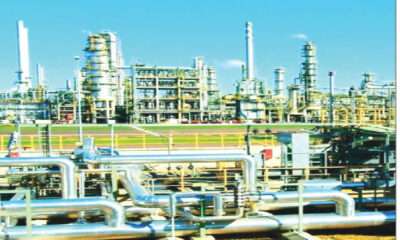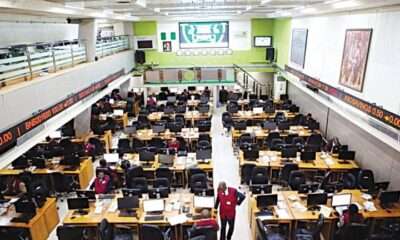Business
$19bn Dangote Refinery Gets Another 1m Barrels Crude Oil
Published
4 months agoon
By
Editor
With the delivery of two million barrels of crude, the $19 billion Dangote Oil Refining Company is set to commence production of petroleum products paving the way for additional jobs and foreign exchange relief to the economy.
This follows yesterday’s delivery of an additional one million barrels of crude oil to the refinery, two weeks after taking the delivery of the first cargo of one million barrels.
The Refinery had disclosed that it purchased the first one million barrels of Agbami crude grade from Shell International Trading and Shipping Company Limited (STASCO), one of the largest trading companies in Nigeria as well as globally, trading over 8 million barrels of crude oil per day.
Also, these represent the first phase of the 6 million barrels of crude oil to be supplied by a range of suppliers.
READ ALSO: PENGASSAN Reacts As Dangote Refinery Misses Production Deadline
The latest cargo, which sailed to the facility’s Single-Point Mooring (SPM) where it was discharged into the refinery’s crude oil tanks, has increased total deliveries to about two million barrels.
Experts in oil and gas said with this level of crude supplies, Dangote Refinery is set to start operations, describing the coming on stream of Dangote Petroleum Refinery and Petrochemicals as a major milestone, capable of making a positive impact in the economies of Nigeria and West Africa.
In a telephone interview with Vanguard, the Executive Chairman, the African Energy Chamber, NJ Ayuk, said: “We are excited to see that the Dangote Refinery has secured its crude cargoes This is a significant milestone, both for the country and the West African region at large.
“With a capacity to produce 350,000 barrels per day, the refinery holds particular significance for the country, where a reliance on fuel imports has been a defining feature for decades, despite its over 37 billion barrels of proven reserves.”
READ ALSO: Fuel Subsidy Hits N1.593tn, Refinery Rehabilitation Gulps N54.66bn
“This cargo will see diesel, aviation fuel and Liquefied Petroleum Gas produced, followed shortly thereafter by the production of Premium Motor Spirit. These products will enable the country to become self-sufficient while exporting to regional neighbours. This, in turn, will strengthen the fiscal dynamics, putting an end to fuel subsidies, high prices and inconsistent supply, thereby setting a strong benchmark for other resource-rich countries in Africa.”
“The project is designed 100% for Nigerian crude and is expected to meet 100% of the country’s demand for refined products, with surplus exported. This, in itself, is a testament to the instrumental role the facility will play in facilitating growth in Nigeria, enabling the country to rely predominantly on its own resources to sustain its economy. We commend the facility for this milestone achieved and we look forward to the first supply of Nigerian fuel products.”
Similarly, the Chairman of International Energy Services, Dr. Diran Fawibe, said: “This is a welcome development that will create many multiplier effects, including additional jobs opportunities. Any producing country would want to allocate a share of its local production to refining and that makes the industry complete.
“The supply of crude oil to the economy used to be considered as a part of energy security, we know from history many countries went to war or influenced war against many nations simply because of importation of products to secure the supply in their country.”
VANGUARD
You may like


Two Soldiers Arrested For Allegedly Stealing Armoured Cables At Dangote Refinery In Lagos


JUST IN: Dangote Slashes Diesel Price


Dangote Names 120km Refinery Road After Wigwe


MTN, Dangote Cement, Others Drag Equity Market To N1.8tn Loss


Army Destroys Illegal Refineries In Rivers, Abia


Full List: Forbes 2024 Top 20 African Billionaires

The Central Bank of Nigeria (CBN) started fresh and direct sales of US dollars at N1,021 per dollar to Bureau De Change operators.
Nigeria’s apex bank disclosed this in a circular signed by its Director of Trade and Exchange Department Hassan Mahmud.
“We write to inform you of the sale of $10,000 by the Central Bank of Nigeria (CBN) to BDCs at the rate of N1,021/$1. The BDCs are in turn to sell to eligible end users at a spread of NOT MORE THAN 1.5 percent above the purchase price,” the circular posted on its website read.
READ ALSO: Tinubu Unveils African Counter-Terrorism Summit
“ALL eligible BDCs are therefore directed to commence payment of the Naira deposit to the underlisted CBN Naira Deposit Account Numbers from today, Monday, April 22, 2024, and submit confirmation of payment, with other necessary documentations, for disbursement of FX at the respective CBN Branches.”
CBN’s move is coming as the naira is recording a slight depreciation against the dollar after weeks of gains.
In late March, the bank also sold $10,000 to each of the eligible Bureau De Change (BDC) operators in the country at the rate of N1,251/$1.
READ ALSO: Mixed Reactions Trail Video Of Couple’s Customised N200 Notes
Like in the most recent sales, it warned BDCs against breaching terms of the dollar sales, vowing to sanction defaulters “including outright suspension from further participation in the sale”.
The fortunes of the naira have fallen sharply since President Bola Tinubu took over in May. Inflation figures have reached new highs and the cost of living hitting the rooftops.
Nigeria’s currency slid to about N1,900/$ some months ago at the parallel market. But in recent weeks, it has gained against the dollar.
The Nigerian authorities have also doubled down on their crackdown against cryptocurrency platform Binance and illegal BDCs.
On March 1, the CBN revoked the licences of 4,173 BDCs over compliance failures.

Olusegun Alebiosu has been appointed as the Acting Managing Director/Chief Executive Officer of First Bank of Nigeria Limited (FirstBank Group), effective April 2024.
Alebiosu steps into this pivotal role from his previous position as the Executive Director, Chief Risk Officer, and Executive Compliance Officer, a position he held since January 2022.
Alebiosu brings to the helm of FirstBank over 28 years of extensive experience in the banking and financial services industry. His expertise spans various domains including credit risk management, financial planning and control, corporate and commercial banking, agriculture financing, oil and gas, transportation, and project financing.
READ ALSO: JUST IN: Access Holdings Names New Acting CEO
Having embarked on his professional journey in 1991 with Oceanic Bank Plc. (now EcoBank Plc.), Alebiosu has held several notable positions in esteemed financial institutions.
Prior to joining FirstBank in 2016, he served as Chief Risk Officer at Coronation Merchant Bank Limited, Chief Credit Risk Officer at the African Development Bank Group, and Group Head of Credit Policy & Deputy Chief Credit Risk Officer at United Bank for Africa Plc.
Alebiosu’s academic credentials further enrich his professional profile. He is an alumnus of the Harvard School of Government and holds a Bachelor’s degree in Industrial Relations and Personnel Management. Additionally, he obtained a Master’s degree in International Law and Diplomacy from the University of Lagos, as well as a Master’s degree in Development Studies from the London School of Economics and Political Science.
READ ALSO: Meet Newly Appointed Union Bank CEO
A distinguished member of various professional bodies, including the Institute of Chartered Accountants (FCA), Nigeria Institute of Management (ANIM), and Chartered Institute of Bankers of Nigeria (CIBN), Alebiosu is renowned for his commitment to excellence and ethical practices in the banking sector.
Beyond his professional endeavors, Alebiosu is known for his passion for golf and adventure. He is happily married and a proud parent.
With Alebiosu’s appointment, FirstBank of Nigeria Limited anticipates continued growth and innovation under his leadership, reinforcing its position as a leading financial institution in Nigeria and beyond.
Business
CBN Gives New Directive On Lending In Real Estate
Published
1 week agoon
April 17, 2024By
Editor
The Central Bank of Nigeria, CBN, has released a new regulatory directive to enhance lending to the real sector of the Nigerian economy.
The directive, issued on April 17, 2024, with reference number BSD/DIR/PUB/LAB/017/005 and signed by the Acting Director of Banking Supervision, Adetona Adedeji, signifies a notable shift in the bank’s policy towards a more contractionary approach.
In line with the new measures, the CBN has reduced the loan-to-deposit ratio by 15 percentage points, down to 50 per cent.
This move aligns with the CBN’s current monetary tightening policies and reflects the increase in the Cash Reserve ratio rate for banks.
READ ALSO: JUST IN: CBN Gov Sacks Eight Directors, 32 Others
The LDR is a metric used to evaluate a bank’s liquidity by comparing its total loans to its total deposits over the same period, expressed as a percentage.
An excessively high ratio may indicate insufficient liquidity to meet unexpected fund requirements.
All Deposit Money Banks are now mandated to adhere to this revised LDR.
The CBN has stated that average daily figures will be utilised to gauge compliance with this directive.
Furthermore, while DMBs are encouraged to maintain robust risk management practices in their lending activities, the CBN has committed to continuous monitoring of adherence and will adjust the LDR as necessary based on market developments.
READ ALSO: JUST IN: CBN Increases Interest Rate To 24.75%
Adedeji has called on all banks to acknowledge these modifications and adjust their operations accordingly. He emphasised that this regulatory adjustment is anticipated to significantly influence the banking sector and the wider Nigerian economy.
The circular read in part, “Following a shift in the Bank’s policy stance towards a more contractionary approach, it is crucial to revise the loan-to-deposit ratio policy to conform with the CBN’s ongoing monetary tightening.
“Consequently, the CBN has decided to decrease the LDR by 15 percentage points to 50 per cent, proportionate to the rise in the CRR rate for banks.
“All DMBs must maintain this level, and it is advised that average daily figures will still be applied for compliance assessment.
“While DMBs are urged to sustain strong risk management practices concerning their lending operations, the CBN will persist in monitoring compliance, reviewing market developments, and making necessary adjustments to the LDR. Please be guided accordingly.”

JUST IN: Gas Explosion Rocks Abeokuta

Oba Of Benin Suspends Six Officials For Posing As Palace Emissaries To Ooni Of Ife

EFCC Boss Appoints Chief Of Staff, 14 Zonal Directors
Trending

 News3 days ago
News3 days agoDrama! Supporters Of Yahaya Bello Perform Rituals to Prevent His Arrest By EFCC [Video]

 Headline4 days ago
Headline4 days agoDrama As Women Fight Dirty, Breasts Fall Out During Spring Break Outing In US [PHOTOS/VIDEO]

 Entertainment4 days ago
Entertainment4 days agoNollywood Actor, Zulu Adigwe Is Dead

 News3 days ago
News3 days agoVIDEO: Force PRO Orders Arrest Officers Caught On Video Bashing Driver’s Car

 Headline4 days ago
Headline4 days agoMeet 17-year-old Nigerian Who Won $3.5m Worth Of Scholarships From Harvard, 13 Other Foreign Universities

 Metro3 days ago
Metro3 days agoEdo Cultists Kill Rival In Daughter’s Presence, Abandon Getaway Car

 Headline4 days ago
Headline4 days agoVideo Of Girl Being Bullied, Slapped At Lead British School Sparks Outrage Online [PHOTOS/VIDEO]

 Politics5 days ago
Politics5 days agoEdo Guber Final List : Group Knocks LP, Commends, INEC, Yakubu

 Headline2 days ago
Headline2 days agoVIDEO: Meet Nigerian Pastor Who Predicted World Will End April 25

 News4 days ago
News4 days agoBREAKING: Dangote Further Crashes Diesel, Aviation Fuel Price

































